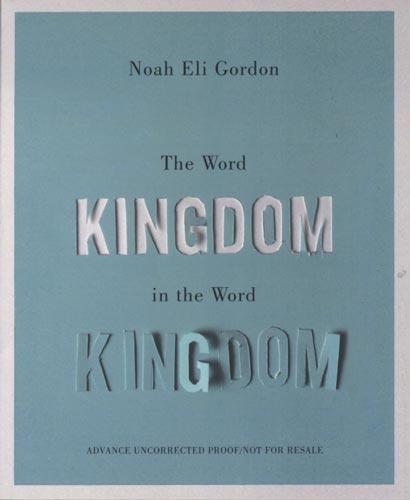The Word Kingdom in the Word Kingdom
This is not a pipe. The word is not the thing. The Word Kingdom in the Word Kingdom shares this sentiment. Noah Eli Gordon presents a modern treason of symbol. His words take flight in the very airplanes he describes. The trajectory is set by meta ontology. As the poems move forward and take shape, there is the sense that a message was thought of before the descriptions, that the writing has an agenda. However, there is a playful sense of tumbling through, that the words are allowing each other to create the next one. The message of origins of language and the etymology of our very ideas are shrouded in mystery. This is not a pipe. The word is not the thing. The Word Kingdom in the Word Kingdom shares this sentiment. Noah Eli Gordon presents a modern treason of symbol. His words take flight in the very airplanes he describes. The trajectory is set by meta ontology. As the poems move forward and take shape, there is the sense that a message was thought of before the descriptions, that the writing has an agenda. However, there is a playful sense of tumbling through, that the words are allowing each other to create the next one. The message of origins of language and the etymology of our very ideas are shrouded in mystery. The attempt is at once novel and rooted in tradition. The Word Kingdom in the Word Kingdom runs along in a quasi-philosophical tone that is accessible while being fringe. It is interstitial poems for the modern era. More than anything, it is noisy sirens rushing by and causing the reader to ponder the silence outside and in.
Magritte pointed to the fact that the image we see is not the real thing. One could not load the pipe in the painting with tobacco. In the same sense, the words we use are merely symbols and not the real thing. The poems are laid out like a blueprint. The first, “An Example” starts the book off with a of a rushing subway car through the middle of the room. It symbolizes the very way that language lifts the reader out of their natural environment. The second poem is very tactile and gives the sense of reality that he is alluding to. Soon after, we reach the title poem The Word Kingdom in the Word Kingdom. It provides an early touchstone line that aids in decoding future material:
The universe is everywhere authoritatively. Each that that that the baby names:
little embraced idea – our resplendent lacuna grown larger.
Because reality, life, the world outside of our impoverished perspectives exists whether we think it does or not. Or at least, it doesn’t seem to need our perspective. As we grow in knowledge—as individual, as culture, as species—we make claim to truths that aren’t inherently true. Gordon knows this. And he says it with the heart of a comedian by way of the sage: “If I think of rain I think of rain, but that doesn’t mean it does.” and “First, there was a picture without its spectator, then the world bursting with spring.”
This is the real locus of the poems. Everything seems to proceed from this point. Occasionally the poems lose their focus. They wander around in the word kingdom. What a luxury Gordon invented for himself: a book that has given itself permission to be playful and creative while still delivering message after message. The prevailing theme is that the use of tropes can re-invent the universe that we already believe we’ve invented. And this bolsters the fact that, in ways, we have. The power of creation lies in the human spirit and in his “Best American Experimental Poetry.” The power of a joke. The truth that his nineteen-month-old daughter can count to three, but she is much more comfortable stopping at two and repeating one, two a few times. There are references laden throughout. “Why I Am Not An Academic” rings like Frank O’Hara’s “Why I Am Not A Painter” with the use of clever enjambment and the fact that this cerebral collection is quite academic. The poem “Ten Ways To Put Together An Airplane” has truth in jest when it calls theologians and art critics, animals. In this, he uses his tactic of reinvention to challenge and reformulate the universe. The book builds on itself as well. Lines such as “the ghost of one sustained cello note” are used repeatedly throughout the text, along with motifs of language and airplanes, construction and desire.
The book is trying to do the impossible: remove language from the actual thing it describes and awaken the reader in the same sense as the old Buddhist saying, “the finger pointing to the moon is not the moon,” but Gordon is comfortable in his attempt. It is a delightful and successful attempt and he is triumphant in the final poem “This.” “This” is a formulation of minimalism and completely congruent with his plan. He has shown that “Building is the most beautiful verb.”
Now he delivers the sirens that will wake up everyone in the house. It is all these delightful things that serve as muse for creation, for origin, for ontology. Language is the medium, the communicator, the fun and the nuisance, the problem and the confusion. Straddling both of these worlds Gordon babbles something something something.





